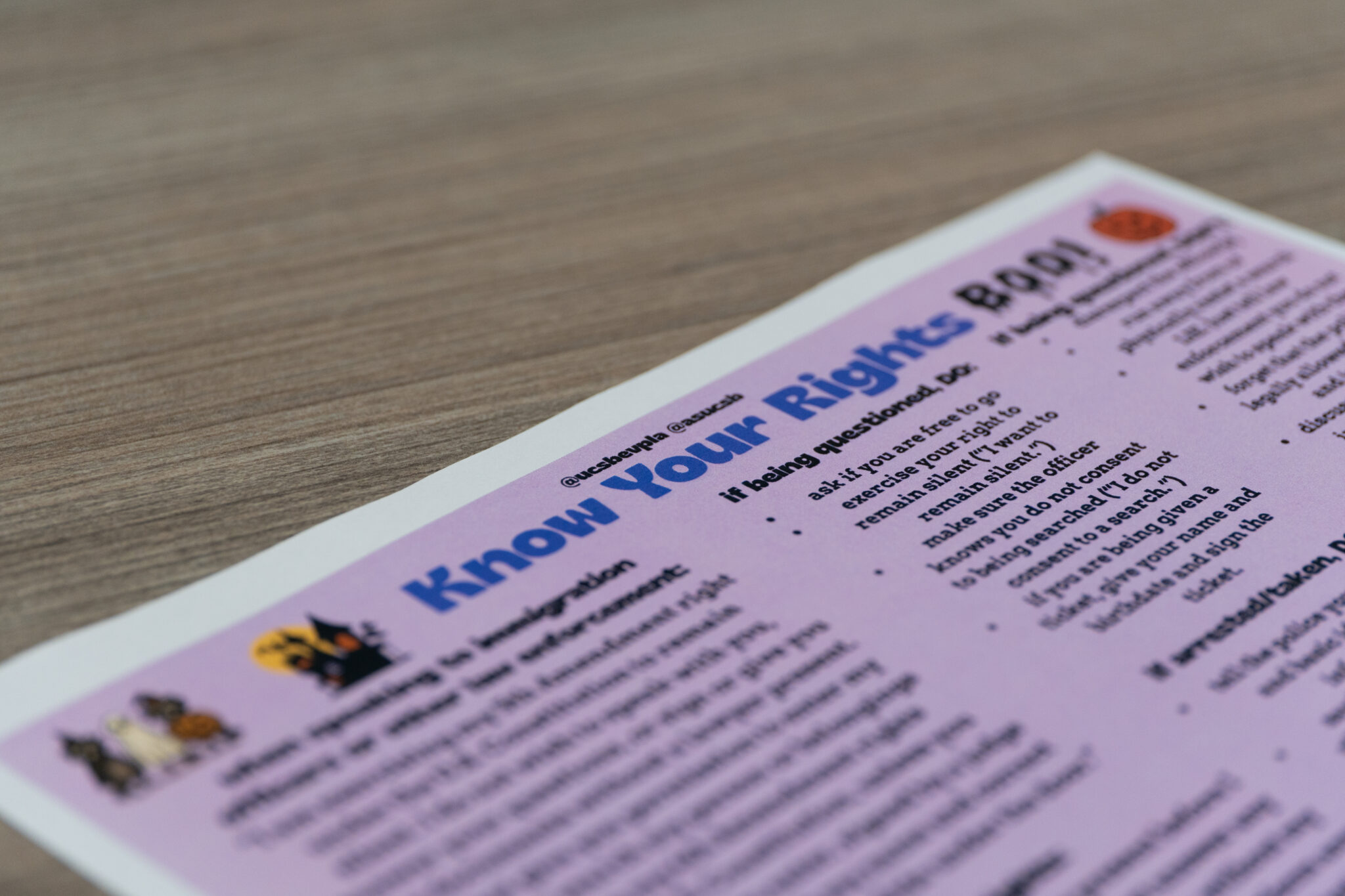The Office of the External Vice President for Local Affairs hosted a Halloween-themed “Know Your Rights” workshop on Monday, Oct. 20, at 4:00 p.m. at the Pardall Center.

The event featured a slideshow including information on how to interact with police during Halloween weekend. Shengyu Zhang / Daily Nexus
Considering the yearly Halloween noise ordinance from Oct. 26 to Nov. 4, this workshop educated attendees on how to handle specific scenarios with police, the workshop reminding attendees of their rights to remain silent, not consent to searches and to document interactions.
The Office of the External Vice President for Local Affairs (EVPLA) holds “Know Your Rights” workshops before extended noise ordinances like Halloween and Deltopia, a yearly unsanctioned street festival. According to organizers, these events see high numbers of citations, and these workshops aim to reduce these numbers.
The presentation was given by EVPLA Chief of Staff and third-year political science major Aanuska Tripathi, fourth-year sociology major and EVPLA police liaison Omar Opeyany and third-year earth science major and EVPLA community events coordinator Jasmine Reza. EVPLA and third-year political science major E.J. Raad also attended and helped coordinate the event.
They began the workshop by clarifying that, when interacting with the police, anyone has the right to remain silent and not be subjected to “unreasonable searches and seizures.” Tripathi clarified that the Fifth Amendment enables individuals to refuse to answer any questions by police or government officials, but remaining silent is a form of consent if an officer asks to do a search.
According to Tripathi, police can search individuals without a warrant if they have weapons within wingspan, under exigent circumstances such as a pursuit and the “plain view doctrine,” which means if the public eye and police officers can see it, the cops have the right to seize it. Tripathi emphasized that individuals have the right to not consent to searches but should always comply with lawful orders.
Tripathi also emphasized one’s right to have an attorney present before you speak, to refrain from answering any questions and to not agree to perform any tests.
As far as alcohol possession, the presentation discussed that any public possession of alcohol could be enough to warrant a ticket. A minor in possession citation can be given to anyone under the age of 21 carrying alcohol. However, anyone over the age of 21 can still get a ticket for carrying an open container.
The presentation also included three different kinds of police encounters: conversation, detention and arrest. As far as conversation encounters, Tripathi said the “best thing you can do is remain silent,” as agreeing to speak to the police could lead to giving information that can be used for an arrest.
“The police do have the power to lie, so please be careful when you do engage in conversation with them. So your best bet is to be polite, but be firm when you say that you don’t want to speak to them, and make sure you are doing this verbally; if you shake your head, that’s not consent,” Tripathi said.
The second form of encounters, being detained, can happen if an officer has any reasonable suspicion that someone is involved in a crime. Opeyany said it’s important to make any conversation with police as simple as possible while detained.
“When they do talk with you, and they have suspicion that you did do something, every word that they use, every sort of everything’s very methodical, and they’re basically trying to see if you’ll admit to it, and that’ll make their job way easier,” Opeyany said.
When under arrest, they recommend individuals to remain silent and to ask for a lawyer, which legally requires officers to stop questioning. If given a ticket, they advised individuals to give their name, birthday and signature, as declining could be grounds for arrest.
Tripathi also advised attendees to avoid disrespecting any police officers.
“I know it’s really fun to make fun of these police officers, and it might come naturally to us, but it could lead to your arrest. So try your best to try to avoid being arrested,” Tripathi said.
They also advised that, when under arrest, individuals should avoid discussing their case on the phone, as the police “are recording your phone calls,” and to not make any decisions regarding the case without talking to a lawyer. Tripathi also suggested not to discuss citizenship or immigration status with anyone other than a lawyer.
When an audience member asked what to do if someone you are with is being arrested, Opeyany said that, if given a lawful order, one must legally step away. However, he suggested people yell out their rights to whoever is detained and to record and document the situation.
In an interview with the Nexus, Tripathi explained that it is important to educate the community on their rights because of the “sketchy” reputation of local law enforcement.
“Especially in I.V. where our police are known to be suspicious or sketchy, and our environment being [a] party school, I think knowing our rights and protecting ourselves is most important, especially because not many people are aware of their rights,” Tripathi said. “The best thing we can do is kind of spread awareness of what your actual rights are, what rights you have as an individual, make sure that you are being protected from anything that might harm you.”
Reza reiterated that the biggest takeaway for attendees should be to “invoke your right to remain silent, ask for an attorney [and] don’t incriminate yourself” when interacting with law enforcement.
The Office of the EVPLA will also be holding a Halloween Town Hall with representatives from the Isla Vista Foot Patrol, UC Police Department and Isla Vista Community Service District at I.V. Theater on Oct. 22 at 5:30 p.m. to address updates regarding safety and ordinances and to answer the community’s questions.
A version of this article appeared on p. 5 of the Oct. 23 print edition of the Daily Nexus.




















